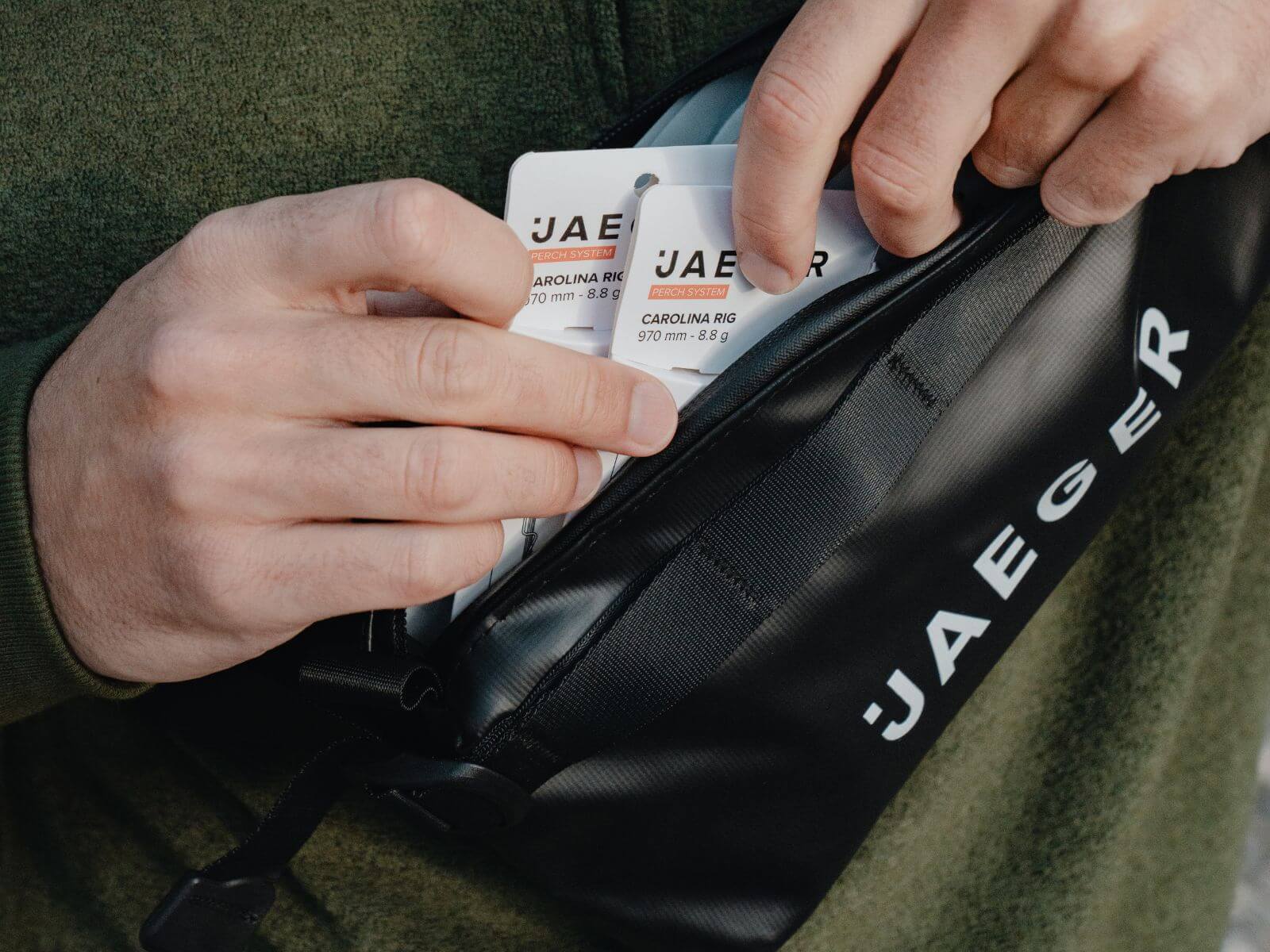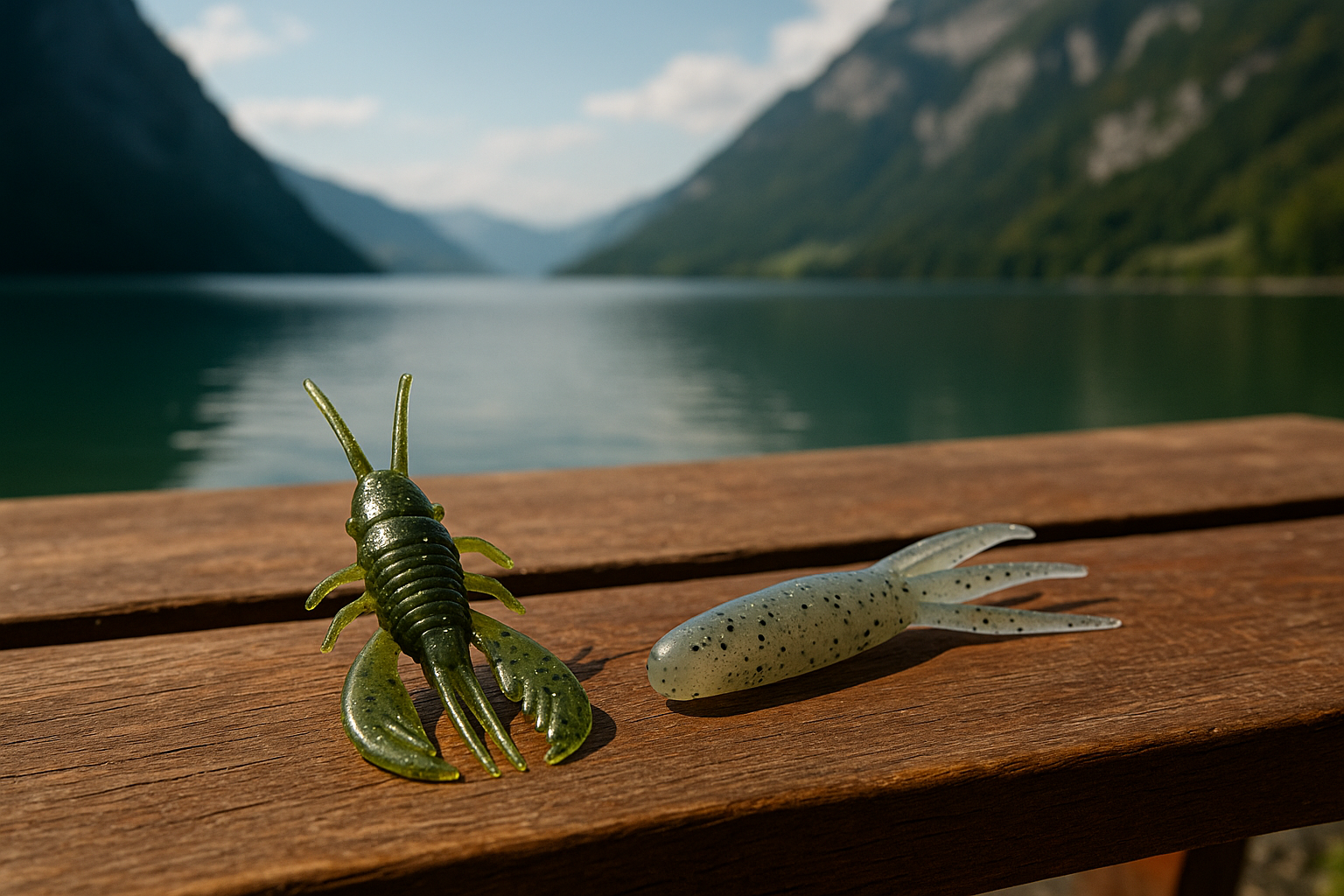
Texas Rig 101 – How to Rig, Fish & Catch More Bass
You want to catch more bass but you're not sure how to properly set up or fish a Texas Rig? You’re not alone. Many anglers struggle because they rig it wrong, pick the wrong bait, or simply don’t fish it the right way for the conditions. The result? Fewer bites, fewer fish, and a lot of frustration on the water.
This guide will change that. Here, you’ll learn everything you need to know about the Texas Rig – from the right setup, hooks and weights to proven fishing techniques that get more bites and better bass. Whether you’re fishing shallow, through heavy cover, or targeting deep water bass. Trust me, with these tips, you’ll fish smarter and more confidently and also catch more.
Texas Rig 101 – How to Rig, Fish & Catch More Bass – Everything at a Glance
- • What is a Texas Rig and why use it?
- • How to rig it step-by-step
- • Best hooks, weights & soft plastics
- • Proven techniques for more bass
- • Common mistakes and how to avoid them
- • Why the JAEGER Bass Kit is perfect for Texas Rig fishing
What is a Texas Rig?
The Texas Rig is one of the most popular and versatile setups in bass fishing and for good reason. It’s a simple yet highly effective rig designed to present soft plastic baits in a natural and weedless way, making it ideal for fishing around heavy cover like grass, timber, or rocks.
A Quick Look at the Texas Rig Origins
The Texas Rig first gained popularity in the bass fishing scene of the southern United States, especially, as the name suggests, in Texas. Local anglers needed a rig that could slide through thick vegetation without constantly snagging while still allowing a natural bait presentation close to the bottom. The solution is a sliding bullet weight paired with a soft plastic bait, rigged weedless on an offset hook. Since then, this setup has become a go-to technique for bass anglers worldwide.
Why Use a Texas Rig?
✓ Weedless Presentation – The hook point is buried in the bait, making it nearly snag-free.
✓ Highly Versatile – Works in shallow or deep water, clear or stained, cold or warm conditions.
✓ Natural Action – Perfect for bottom-hopping, dragging, or deadsticking soft plastics.
✓ Perfect for Pressured Waters – Subtle and natural enough to trigger bites even on tough days.
How to Set Up a Texas Rig
One of the reasons the Texas Rig is so popular: it’s simple to set up, even for beginners. Here’s a quick step-by-step breakdown so you understand exactly how it works.
Step-by-Step Texas Rig Setup
-
Start with your hook – typically an offset worm hook or EWG hook.
-
Slide on a bullet weight (pointed side facing forward).
-
Optional: Add a bead between the weight and hook for extra sound and attraction.
-
Tie your knot of choice (improved clinch knot or Palomar are both great options).
-
Rig your soft plastic bait weedless on the hook – this could be a worm, creature bait, or craw-style bait.
That’s it. Once set up, the weight can slide freely along the line, allowing your bait to move naturally while keeping the hook point protected inside the plastic for a weedless presentation.
No Time to Rig? JAEGER Has You Covered
At JAEGER USA, we’ve done the work for you. Our Bass Kits come fully equipped with perfectly matched Texas Rig hooks, weights, beads, and soft plastics – ready to fish right out of the box. No guessing, no fiddling. Just tie it on and go.

JAEGER Texas Rig – Ready to Go
★★★★★ (2 reviews)
Includes everything you need for the perfect Texas Rig setup:
5/16 oz tungsten bullet weight
0.3 mm fluorocarbon leader, 12lb strength, length 25 in
3/0 offset hook for bass
1 rig per pack – handcrafted to ensure durable, high-quality knots.
When Should You Use a Texas Rig?
The Texas Rig shines in situations where many other rigs struggle. If you’re dealing with heavy cover, tough conditions, or bass that just won’t bite, this setup often outperforms the rest.
Perfect for Fishing Cover
Bass love hiding in places where other rigs get stuck think weedbeds, submerged timber, brush piles, and rock structures. Thanks to its weedless presentation, the Texas Rig slides through this cover cleanly, allowing you to reach fish that others can’t.
Ideal for Tough Conditions
Whether it’s after a cold front, during bright sunshine, or on heavily pressured waters, bass often hunker down and won’t chase fast-moving baits. That’s when the slow, natural presentation of a Texas Rig excels. It allows you to work your bait right in front of the fish for longer, increasing your chances of a strike.
What Line Do I Use for a Texas Rig?
Choosing the right fishing line for your Texas Rig can make a big difference in both performance and confidence on the water. While there’s no one-size-fits-all answer, here’s how to pick the best option for your style of fishing.
Fluorocarbon vs. Braid vs. Monofilament what’s Best?
1. Fluorocarbon:
The most popular choice for Texas Rig fishing. It’s nearly invisible underwater, has low stretch for solid hooksets, and is abrasion-resistant — ideal for fishing through cover like rocks, timber, or grass.
2. Braid:
Braid shines in heavy vegetation and thick cover. It’s ultra-strong with zero stretch, giving you maximum sensitivity. However, it’s highly visible underwater, so many anglers tie on a fluorocarbon leader for stealth.
3. Monofilament:
Less common for Texas Rig setups, but it can work in very clear, open water or when you want a bit more stretch. It floats, so it’s usually not the top choice when fishing bottom-contact rigs like Texas.
Knot Recommendations for Texas Rig
✓ Palomar Knot – Simple, strong, reliable, perfect for braid or fluoro.
✓ Improved Clinch Knot – Great choice for fluorocarbon connections.
✓ Uni-to-Uni Knot – Ideal for braid-to-fluorocarbon leaders.
"Your knot is your connection to the fish — make it strong, make it count."
What Weight Should I Use on a Texas Rig?
The weight you choose for a Texas Rig isn’t random – it should match the depth, cover, and conditions you’re fishing. Picking the right size helps your bait move naturally, get through cover effectively, and stay in the strike zone longer.
How to Choose the Right Weight
Light (1/8 oz – 1/4 oz):
Perfect for shallow water, sparse cover, or when bass are finicky and prefer a slower fall. Great for finesse fishing or clear water.
Medium (3/8 oz – 1/2 oz):
The go-to for most situations. Ideal for moderate depth (6-15 ft), fishing through brush, light weeds, and rock structures.
Heavy (5/8 oz – 1 oz+):
Use when you need to punch through dense vegetation, fish deep ledges, or when current requires your bait to stay down.
Impact on Bait Presentation
✓ Lighter weights allow a slower, more natural fall – great for hesitant fish.
✓ Heavier weights keep your bait in contact with the bottom and help break through thick cover fast.
What is the Best Bait for a Texas Rig?
The beauty of the Texas Rig is its versatility with soft plastics. From worms to creatures, here’s how to pick the right bait for the job.
Go-To Baits for Texas Rig Fishing
-
Worms:
A classic choice – straight-tail, ribbon-tail, or finesse worms excel for a natural, subtle presentation. Perfect for clear water or pressured fish. -
Creature Baits:
Great for heavy cover and aggressive fish. They move water, create vibration, and mimic craws or baitfish. -
Craws:
Ideal when bass are feeding on bottom-dwelling forage. Pair with a lighter weight for a slow, realistic crawl along structure. -
Swimbaits (Soft Plastics):
For covering more water or when bass are chasing baitfish. Adds movement and flash to your Texas Rig.

TERA – Bass Soft Bait
★★★★★ (1 review)
The TERA is inspired by nature's most irresistible bugs, featuring vibrating side arms and ultra-sensitive legs that mimic lifelike insect movements. This bait is built to trigger aggressive strikes in any water, weather, or season. Perfect to combine with the Texas Rig.
Size & Color Tips
-
Match bait size to conditions: Smaller (3–4") for finesse, Larger (5"+) for aggressive fish or bigger profiles.
-
Choose natural colors (green pumpkin, watermelon) in clear water, and bold colors (black/blue, junebug) in stained or muddy water.
Best Hooks for Texas Rig
Choosing the right hook style and size ensures your bait looks natural and your hooksets land fish.
Offset Worm Hook vs. EWG (Extra Wide Gap)
1. Offset Worm Hook
Perfect for slimmer baits like straight-tail worms. Provides a clean, weedless presentation with solid hookups.
2. EWG Hook
Better for bulkier baits like creatures or craws. The wide gap helps compress the plastic, exposing the hook for better hooksets.
Recommended Hook Sizes (Bass Fishing)
-
3/0 to 5/0 – The sweet spot for most soft plastics.
-
Smaller (2/0): Light finesse worms.
-
Larger (5/0+): Big creatures, bulky craws.
Why Weedless Hooks Matter
✓ Keeps your bait clean in heavy cover
✓ Prevents snags
✓ Increases confidence to fish deeper into structure where big bass hide
Texas Rig Fishing Techniques for More Bites
Common Mistakes to Avoid with Texas Rig
Even though the Texas Rig is simple and versatile, there are a few common mistakes that can ruin your presentation – and your chances of getting bit. Here’s what to watch out for.
Too Heavy on the Weight
If your weight is too heavy, your bait falls unnaturally fast and loses its subtle action. This makes it harder for bass to commit, especially in clear water or when they’re less aggressive. Choose the lightest weight you can get away with for the conditions.
Wrong Hook Choice
Not every bait pairs well with every hook. A slim finesse worm doesn’t need a big EWG hook, while a bulky creature bait will struggle with a thin-wire offset. Match your hook style and size to your bait.
Poor Presentation (Too Fast)
One of the biggest mistakes is working your Texas Rig too fast. This isn’t a power fishing technique, it’s about slow, deliberate movements that let bass find your bait. Rushing through a spot means missed bites.
Line Too Strong or Wrong Type
30 lb braid in open water with no cover? Overkill. 10 lb mono in dense timber? Too weak. Use the right line for your environment so your bait acts naturally, and you stay connected when the big one bites.
Ignoring Key Spots (Cover & Structure)
Texas Rigs shine in cover, grass lines, timber, brush piles, and rock transitions. If you’re only casting open water, you’re missing the rig’s biggest strength. Always focus on where bass hide and hunt.
Seasonal Texas Rig Fishing Tips
The Texas Rig works all year long, but knowing how to adjust your strategy with the seasons will help you catch more fish. Here’s how to fish it smarter, season by season.
Spring: Shallow, Cover-Oriented, Pre-Spawn Patterns
In spring, bass move into shallow flats and protected cover to prepare for spawning. This is prime time for the Texas Rig. Focus on laydowns, grass lines, and hard-bottom areas near spawning bays.
Key Tips:
-
Light to medium weights for a slower fall
-
Natural-colored creature baits and worms
-
Work slowly through key pre-spawn cover
Summer: Go Deep, Go Slow, Target Structure
As water temps rise, bass head deeper into ledges, humps, and heavy cover to escape the heat. The Texas Rig excels at getting down into thick stuff — perfect for punching, dragging, or slow-hopping through dense cover.
Key Tips:
-
Heavier weights for faster fall and better control
-
Darker baits like black/blue for stained water
-
Focus on timber, grass mats, brush piles
Fall: Follow the Baitfish, Stay Mobile
In fall, bass are chasing shallow baitfish in transition areas — points, flats near deep water, and creek channels. A Texas Rigged craw or worm mimics this forage perfectly.
Key Tips:
-
Medium weights for controlled fall speed
-
Match bait color to local forage (green pumpkin, shad hues)
-
Stay mobile — fish move fast in fall
Winter: Slow, Precise, Deep Water Focus
Cold water calls for patience. Bass gather around deep structure and isolated cover. Your Texas Rig should barely move — think deadsticking, small hops, and long pauses.
Key Tips:
-
Light to medium weights for subtle presentation
-
Downsized baits, natural colors
-
Target deeper pools, ledges, and isolated structure
Texas Rig vs. Other Bass Rigs
Each bass rig has its strengths. Knowing when to pick the Texas Rig over others will help you adapt to the conditions and catch more fish.
Customer Reviews
★★★★★
06/27/2025 – Jake M. (US)
Super easy to rig and the components are top-notch. Landed my PB largemouth on this setup!
★★★★★
06/12/2025 – Brian L. (US)
The Texas Rig from JAEGER just works. Quality hooks, strong knots, and perfect for heavy cover bass.
★★★★★
05/31/2025 – Ethan R. (US)
Love the weedless setup. Pulled fish right out of the thickest grass without a problem. Highly recommend!
Best Texas Rig

JAEGER Texas Rig – Ready to Go
★★★★★ (2 reviews)
The perfect pre-tied Texas Rig for bass fishing. Includes everything you need to fish confidently through cover or open water.



Leave a comment
This site is protected by hCaptcha and the hCaptcha Privacy Policy and Terms of Service apply.